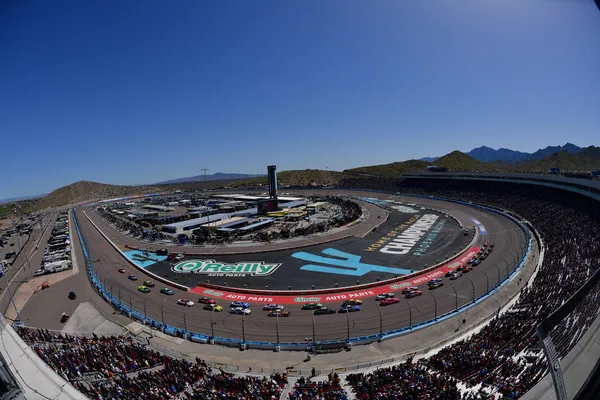
I think the racing that our drivers have put on is extraordinary. I think it’s the best racing we have ever had on those race tracks.” This is what NASCAR President Steve Phelps previously said on the 2024 NASCAR season. However, has it really been the best racing? Or has the Superspeedway package been extraordinary? At the most recently reconfigured Atlanta race, there was barely any passing. Only three or maybe four times we saw a third lane.
Superspeedway races in the NASCAR Cup Series aren’t what they used to be. Nowadays, it’s less about intense racing and more about playing the strategy game. Teams are now heavily focused on fuel economy and minimizing pit stops to gain an advantage—a new trend that has caught on significantly. This was evident in the Atlanta race, as discussed by NASCAR insiders on the Door Bumper Clear podcast. Freddie Kraft even offered an interesting solution to the problem.
A solution to NASCAR’s struggling Superspeedway package?
In 2022, NASCAR announced that Cup Series teams would race with 510 horsepower and a 7-inch spoiler at superspeedway events, including Daytona, Talladega, and Atlanta Motor Speedway. Additionally, Atlanta’s track was repaved and underwent significant changes, with banking increased to 28 degrees and the racing surface narrowed from 55 feet to 40 feet. This was part of NASCAR’s attempt to make the series more entertaining. But did it work? According to some NASCAR insiders, not quite, due to the glaring issue of fuel mileage strategy dominating the races.
On the recent episode of Door Bumper Clear, Freddie Kraft was disappointed that drivers did not race hard. He said, “I don’t want fuel mileage to dictate how hard we race in plate races. You know, and it’s not as big of a deal at Atlanta as it is at Daytona Talladega. But it’s still a pretty big deal they were doing it you know you had a save you saw the 2 car, (Austin Cindric) dominates the first two stages just out there riding. He’s dominating, he finished, I think second in the first stage wins the second you never saw him in the third stage. Because he had to take more fuel than everybody at the end of the second stage.”
To wrap up what Kraft is saying, drivers were playing it safe, trying to get the maximum points. Not going for a win does reduce the entertainment value of the race, which was NASCAR’s goal with this new Superspeedway package. To solve the fuel milage issue, Kraft had a solution. He said, “I mean I think a solution could be just like Brett’s been harping on for about 10 years now. It seems like eliminate the cautions at the stage breaks.” According to Kraft, this could help in conserving some fuel as opposed to how cars keep lapping and burning it. NASCAR has in the past discussed removing them but hasn’t yet.
Maybe Kraft’s solution can be implemented. After all, no one wants to see a race where the veteran, Denny Hamlin, is running so cautiously. If you see Hamlin’s run, you’d expect him to try to make his way to the front after starting last in the race. But that didn’t happen. The car’s handling issues, combined with a team strategy focused on securing 20 points, resulted in a 24th-place finish. Denny Hamlin recently explained why things were a lot tamer at Atlanta.
Joe Gibbs Racing’s #11 car, driven by Denny Hamlin, saw its race strategy go awry at Atlanta Motor Speedway this weekend. Despite a data-driven approach, Hamlin’s cautious driving didn’t yield the success he had hoped for. He aimed to avoid risks, expecting to benefit if trouble struck the cars ahead. However, this strategy backfired, resulting in a 32nd-place finish. Recently, Hamlin explained why the Atlanta race was generally slow.
He said, “The track had lost grip. Everyone’s car wasn’t handling quite as good as it was. The pace was about 6 to 8 tenths off what it was in the spring. The track is a little slower, that means, cars are driving a little bit worse. With that I think the cars weren’t able to get as close to each other as they were in the spring.” The Atlanta track was repaved in 2022, just in two years it’s gotten degraded and continuous to do so.
Lack of grip makes the car handling a challenge on the track. Making drivers cautious and the race slower. All this affects the Superspeedway package, which Kraft thinks the current package is not great as compared to the older one. Further in the conversation, he said, “The package ready isn’t great obviously it’s hard to pass. That’s why we see this that people ask me all the time like why didn’t we do this with the old car why did we save fuel. Because it was easier to pass, you could make moves you could you do things with the old car create runs and go from the back to the front. Now once we get you see it all the time at Daytona, Talladega you see it yesterday. Once you get that group whoever comes out of the pits for the last run in front stays up there.”
Leave a Reply